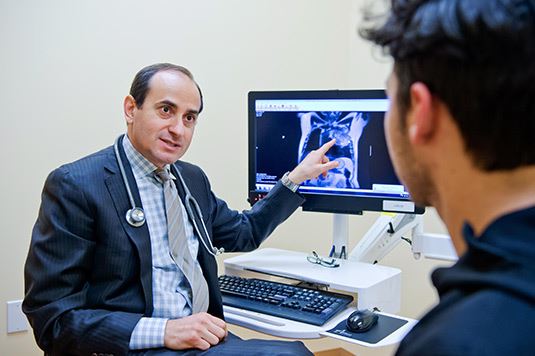
Open Accessibility Menu
Hide
dfh
Close Alert
Close Alert
Author: Bogdan Eftimie, MD
Specialty: Hematologist/Oncologist at the UCSF - Washington Cancer Center

In medicine, particularly in the treatment of cancer, there’s no such thing as universal. No two people are the same. Their cancers aren’t the same. And the way they respond to therapies aren’t the same.
As medical director of the UCSF – Washington Cancer Center, I’m involved in the programmatic development of the cancer program, which includes a host of services that seek to support patients from diagnosis and beyond, including social work, nutrition, and, potentially, palliative care. One important aspect of this comprehensive cancer care model is our focus on precision medicine.
As health care moves away from a traditional one-size-fits-all model, precision medicine offers us the opportunity to create individualized treatment plans that take into account the person as a whole. By combining genetic analysis, medical history, lifestyle, and expectations, physicians can develop and recommend therapies that are not only effective but increase quality of life while treating the disease.
Precision medicine isn’t just another marketing term, it’s a medical model that uses factors like lifestyle, environment, and individual genetic variability to choose the best therapies and prevention strategies. Contrary to popular belief, it’s not tailored to a specific individual, but, rather, to a subpopulation. What precision medicine is not, however, is a silver bullet. Neither simple nor absolute, it uses all available knowledge to predict the most effective, least detrimental treatment plan.
Simply because of the possibility that it allows.
In the past decade, the cost of DNA sequencing has dropped significantly. What once cost tens of thousands of dollars can now be done for just a few hundred dollars. For institutions and academic medical colleges, it was that cost prohibitiveness that really stood in the way of significant genetic research. With that barrier lifted, we’re finding that just because we have the ability to sequence DNA and identify mutations doesn’t mean we always know what to do with that information.
Not yet, anyway.
So while, yes, precision medicine can inform personalized treatment, its biggest contribution, at present, is in amassing a library of mutations from which we can research, compare, and develop new treatments to target.
It used to be that cancers were classified and diagnosed by organ of genesis – think lung cancer, colon cancer, or prostate cancer. This led to a one-size-fits-all approach to treatment that yielded vastly different responses in patients. You’d receive a diagnosis and treatment plan that would, essentially, take you, trial and error, through treatment options. Only once those options were exhausted would non-standard therapies be considered.
It took years of research on a genetic level to understand how and why a type of cancer may behave a certain way. Not only does that increase the effectiveness of therapies targeting that specific type of cancer, we can see genetic similarities across different forms of cancers which widens treatment options.
For instance, prostate cancer used to be thought of as hormonally driven. It wasn’t until a few years ago that we realized that some prostate cancer patients also had a higher instance of the BRCA-mutation. What it means for those instances is that other therapies employed for breast or ovarian cancers driven by BRCA mutations can also be used in prostate cancer.
This wouldn’t be possible without precision medicine.
With its precision cancer medicine, UCSF has dedicated significant resources to the collection, mapping and synthesis of data to gain a clearer picture of how diseases, like cancer affect populations. A world leader in molecular oncology, the UCSF 500 Cancer Gene Panel test identifies mutations within the DNA of a patient’s tumor and matches them with targeted therapies and clinical trials. Beyond treatment, in some cases, the UCSF 500 can offer a definitive diagnosis of the type of cancer a patient has, or even identify genetic markers (like the BRCA mutation) that may affect a patient’s family members in the future.
As its name implies, the UCSF – Washington Cancer Center is a partnership between UCSF Health and Washington Hospital Healthcare System. It provides both inpatient and outpatient care, support, and education. The goal of this partnership is to create a comprehensive, regional healthcare network, and provide Tri-City residents access to some of UCSF’s best specialty services. Included is the precision medical approach to cancer diagnosis, treatment and research – without the cost, time, and, quite frankly, hassle associated with having to travel to San Francisco.
While precision medicine in its current form is not a cure-all – or even a cure most – it’s a driving force in this shift toward more intelligent, more personalized care. By partnering with UCSF Health, Washington Hospital Healthcare System has made a long-term investment in bringing this data-driven future to our community. What that means in the context of cancer care is patients and populations have better access to screenings and therapies that ultimately lead to better outcomes.
Posted July, 2019